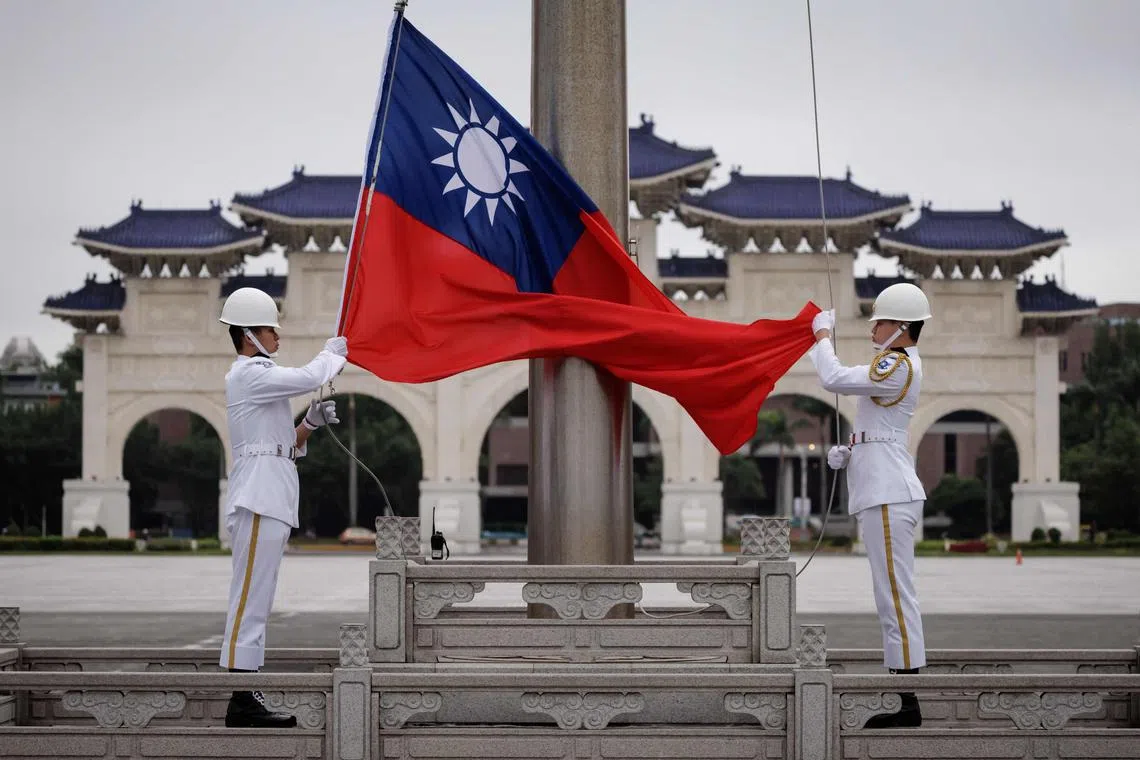Trump’s remark that Taiwan should pay for defence sends TSMC stock down
Sign up now: Get insights on Asia's fast-moving developments

The US is Taiwan’s most important international supporter and arms supplier, but there is no formal defence agreement.
PHOTO: AFP
TAIPEI – Taiwan should pay the US for its defence as it does not give the country anything, Republican presidential candidate Donald Trump told Bloomberg Businessweek, sending shares of Taiwanese chip manufacturer Taiwan Semiconductor Manufacturing Company (TSMC) lower on July 17.
“I know the people very well, respect them greatly. They did take about 100 per cent of our chip business. I think, Taiwan should pay us for defence,” Trump said in an interview with Bloomberg Businessweek on June 25 but published on July 16.
“You know, we’re no different than an insurance company. Taiwan doesn’t give us anything.”
The United States is Taiwan’s most important international supporter and arms supplier, but they have no formal defence agreement, unlike what Washington has with South Korea and Japan. The US is, however, bound by law to provide Taiwan with the means to defend itself.
Taiwan’s government has made defence modernisation a priority, including developing its own submarines, and has said many times the island’s security rests in its own hands.
Taiwanese Premier Cho Jung-tai, responding to Trump’s comments, said Taiwan and the US have good relations despite the lack of formal ties, and the island is dedicated to bolstering its own defences.
“Taiwan has steadily strengthened its defence budget and demonstrated its responsibility to the international community,” he told reporters in Taipei.
“We are willing to take on more responsibility; we are defending ourselves and ensuring our security.”
Taiwan’s Foreign Ministry declined to comment on Trump’s remarks.
Taiwan, which China views as its own territory, has complained of repeated Chinese military activity over the past four years as Beijing seeks to pressure the democratically governed island that rejects China’s sovereignty claims.
US President Joe Biden has upset the Chinese government with comments that appeared to suggest that the United States would defend Taiwan if it were attacked – a deviation from a long-held US position of “strategic ambiguity”.
Washington and Taipei have had no official diplomatic or military relationship since 1979, when the US switched recognition to Beijing and terminated a mutual defence treaty.
TSMC is the dominant maker of advanced chips
There was no immediate reaction from TSMC, which is currently in its quiet period ahead of the company’s second-quarter earnings report.
TSMC shares down
Shares in TSMC, the world’s largest contract chipmaker and a major Apple and Nvidia supplier, closed down 2.4 per cent on July 17. The broader market ended down 1 per cent.
“Trump’s comments were plainly blunt. We see it as political rhetoric,” said Mr Allen Huang, a vice-president at Mega International Investment Service.
“TSMC is an excellent company, and it has won out in the market over many rival companies in the United States.”
TSMC is spending billions building new factories overseas, including US$65 billion (S$87 billion) on three plants in the US state of Arizona, though the company says most manufacturing will remain in Taiwan.
Taiwan also has a backlog worth some US$19 billion of arms deliveries from the US, which American officials and politicians have repeatedly pledged to speed up.
Since 2022, Taiwan has complained of delays in deliveries of US weapons such as Stinger anti-aircraft missiles, as manufacturers focused on supplying Ukraine to help it battle invading Russian forces.
In April, the US Congress passed a sweeping foreign aid package which includes arms support for the island after House Republican leaders abruptly switched course and allowed a vote on the US$95 billion in mostly military aid for Ukraine, Israel and Taiwan and US partners in the Indo-Pacific.
China held two days of war games around the island shortly after President Lai Ching-te took office in May, saying it was “punishment” for his inauguration speech, which Beijing denounced as being full of separatist content.
China has also been using grey-zone warfare against Taiwan, wielding irregular tactics to exhaust a foe by keeping them continually on alert without resorting to open combat. This includes sending balloons over the island and almost daily air force missions into the skies near Taiwan.
Mr Lai, who says only the Taiwanese people can decide their future, has repeatedly offered talks but has been rebuffed. REUTERS


